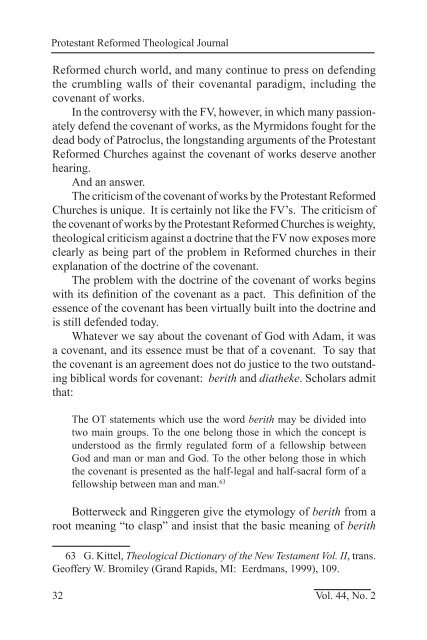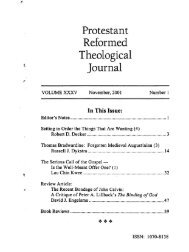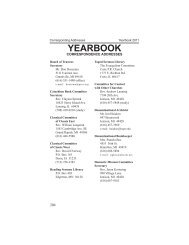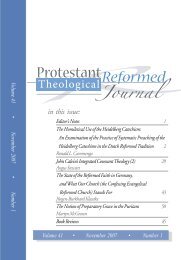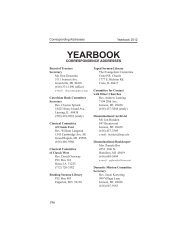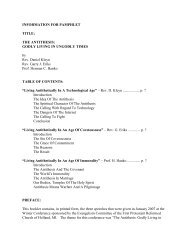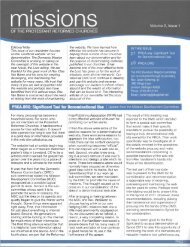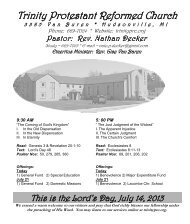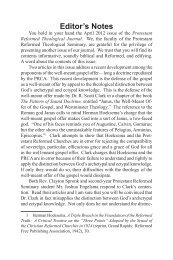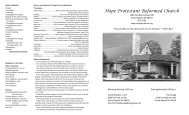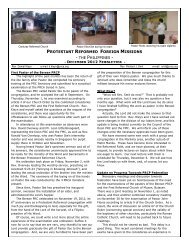A Critique of the Covenant of Works in Contemporary Controversy
A Critique of the Covenant of Works in Contemporary Controversy
A Critique of the Covenant of Works in Contemporary Controversy
You also want an ePaper? Increase the reach of your titles
YUMPU automatically turns print PDFs into web optimized ePapers that Google loves.
Protestant Reformed Theological Journal<br />
Reformed church world, and many cont<strong>in</strong>ue to press on defend<strong>in</strong>g<br />
<strong>the</strong> crumbl<strong>in</strong>g walls <strong>of</strong> <strong>the</strong>ir covenantal paradigm, <strong>in</strong>clud<strong>in</strong>g <strong>the</strong><br />
covenant <strong>of</strong> works.<br />
In <strong>the</strong> controversy with <strong>the</strong> FV, however, <strong>in</strong> which many passionately<br />
defend <strong>the</strong> covenant <strong>of</strong> works, as <strong>the</strong> Myrmidons fought for <strong>the</strong><br />
dead body <strong>of</strong> Patroclus, <strong>the</strong> longstand<strong>in</strong>g arguments <strong>of</strong> <strong>the</strong> Protestant<br />
Reformed Churches aga<strong>in</strong>st <strong>the</strong> covenant <strong>of</strong> works deserve ano<strong>the</strong>r<br />
hear<strong>in</strong>g.<br />
And an answer.<br />
The criticism <strong>of</strong> <strong>the</strong> covenant <strong>of</strong> works by <strong>the</strong> Protestant Reformed<br />
Churches is unique. It is certa<strong>in</strong>ly not like <strong>the</strong> FV’s. The criticism <strong>of</strong><br />
<strong>the</strong> covenant <strong>of</strong> works by <strong>the</strong> Protestant Reformed Churches is weighty,<br />
<strong>the</strong>ological criticism aga<strong>in</strong>st a doctr<strong>in</strong>e that <strong>the</strong> FV now exposes more<br />
clearly as be<strong>in</strong>g part <strong>of</strong> <strong>the</strong> problem <strong>in</strong> Reformed churches <strong>in</strong> <strong>the</strong>ir<br />
explanation <strong>of</strong> <strong>the</strong> doctr<strong>in</strong>e <strong>of</strong> <strong>the</strong> covenant.<br />
The problem with <strong>the</strong> doctr<strong>in</strong>e <strong>of</strong> <strong>the</strong> covenant <strong>of</strong> works beg<strong>in</strong>s<br />
with its def<strong>in</strong>ition <strong>of</strong> <strong>the</strong> covenant as a pact. This def<strong>in</strong>ition <strong>of</strong> <strong>the</strong><br />
essence <strong>of</strong> <strong>the</strong> covenant has been virtually built <strong>in</strong>to <strong>the</strong> doctr<strong>in</strong>e and<br />
is still defended today.<br />
Whatever we say about <strong>the</strong> covenant <strong>of</strong> God with Adam, it was<br />
a covenant, and its essence must be that <strong>of</strong> a covenant. To say that<br />
<strong>the</strong> covenant is an agreement does not do justice to <strong>the</strong> two outstand<strong>in</strong>g<br />
biblical words for covenant: berith and dia<strong>the</strong>ke. Scholars admit<br />
that:<br />
The OT statements which use <strong>the</strong> word berith may be divided <strong>in</strong>to<br />
two ma<strong>in</strong> groups. To <strong>the</strong> one belong those <strong>in</strong> which <strong>the</strong> concept is<br />
understood as <strong>the</strong> firmly regulated form <strong>of</strong> a fellowship between<br />
God and man or man and God. To <strong>the</strong> o<strong>the</strong>r belong those <strong>in</strong> which<br />
<strong>the</strong> covenant is presented as <strong>the</strong> half-legal and half-sacral form <strong>of</strong> a<br />
fellowship between man and man. 63<br />
Botterweck and R<strong>in</strong>ggeren give <strong>the</strong> etymology <strong>of</strong> berith from a<br />
root mean<strong>in</strong>g “to clasp” and <strong>in</strong>sist that <strong>the</strong> basic mean<strong>in</strong>g <strong>of</strong> berith<br />
63 G. Kittel, Theological Dictionary <strong>of</strong> <strong>the</strong> New Testament Vol. II, trans.<br />
Ge<strong>of</strong>fery W. Bromiley (Grand Rapids, MI: Eerdmans, 1999), 109.<br />
32<br />
Vol. 44, No. 2


